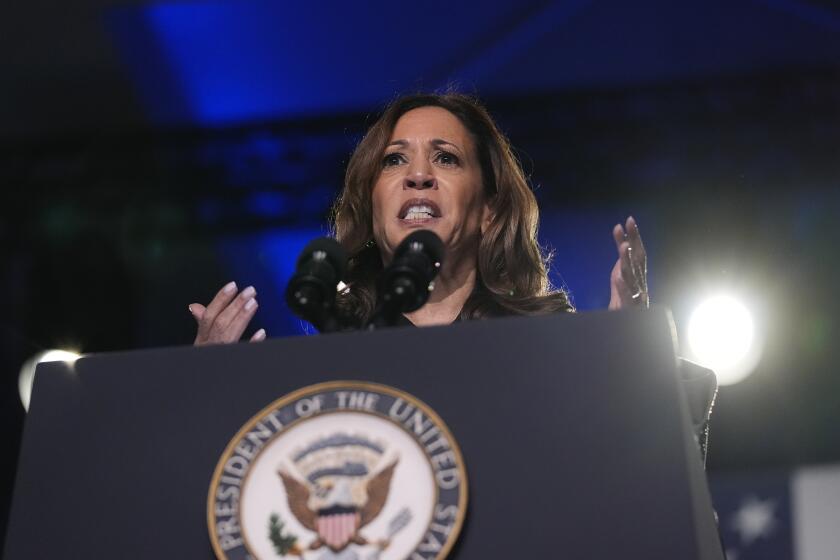Youth voter groups ramp up efforts as deadlines approach
With less than a week to sign up voters in many states, registration groups have revved up their efforts to target young people where they live: on their cellphones, computers and video games.
Rock the Vote, the nation’s largest youth registration group, recently launched a feature on Microsoft’s Xbox 360 that allows gamers to request voter registration forms from their handsets.
And the nation’s four largest nonpartisan voter registration groups have just joined forces with MySpace to launch the Ultimate College Bowl contest, including an online registration application that can be added to almost any website. Whoever signs up the most new voters will win a private concert for their school by the band Death Cab for Cutie.
It’s the future of voter registration -- and it’s working.
Registration among voters younger than 30 has soared. Heather Smith, executive director of Rock the Vote, said her organization has registered 2.3 million voters in the last 15 months and expects to reach 2.5 million. That’s more than twice as many people as the organization registered in 2004.
“It’s certainly enough people to make the difference this November,” Smith said.
The number of young people going to the polls has also increased in recent years. Turnout among people younger than 30 rose by 9% from 2000 to 2004, according to U.S. Census data, more than double the increase of any other age group.
USC student Nelson Chen is one of thousands of young volunteers who are trying to make sure that trend continues. On Wednesday, that meant waking up at 6:15 a.m. and donning a bright yellow T-shirt emblazoned with the words of a voter registration website aimed at young adults, StudentVote.org.
Chen, who chairs his school’s chapter of the Student Public Interest Research Group -- the oldest, largest effort to mobilize college voters -- and a handful of volunteers fanned out across campus, scrawling the Web address on chalkboards in dozens of classrooms before convening to set up for the day’s Txt Out the Vote event.
It worked like this: A volunteer would ask a student passerby to send a text message to a phone number that sends a return message with instructions on how to register to vote. Then the volunteer asked the student to forward the instructions to friends. Within minutes, one volunteer could spread the message to dozens of people.
“It’s a whole lot less effort from us,” Chen said.
One of the people Chen stopped was Jonathan Goldford, a business major.
“One reason a lot of young people aren’t registering is because it’s not too easy,” Goldford said after he sent the text message to his friends. “This is so easy, you just forward it.”
Sujatha Jahagirdar, the national program director for the Student PIRG’s New Voters Project, said young people were more likely to register when asked to do so by a friend.
“It’s not like a stranger telling someone to vote, it’s their friend,” Jahagirdar said. “We think that technology can put grass-roots organizing on steroids.”
It also helps build a database of phone numbers that the registration groups say they will tap in November. Voting rates increase 4% when young people receive a text message reminding them to vote on election day, said Smith of Rock the Vote.
Barack Obama is banking on that. When the Democratic candidate sent a text message to supporters announcing that he had chosen Joe Biden as his running mate, he built excitement as well as a list of voters to contact on Nov. 4. For Obama, this tool could be crucial; polls show young voters prefer him over Republican candidate John McCain by 2 to 1.
Despite that advantage, both candidates are trying to appeal to the under-30 demographic (their campaigns each debuted Facebook voter registration applications last month).
Registration groups targeting youth have always been ahead of the curve when it comes to technology. Rock the Vote started the very first online vote registration in 1996.
In a recent Internet campaign, Rock the Vote gave away a free downloadable version of singer Sheryl Crow’s new album to anyone who persuaded a friend to register. And through a partnership with MySpace, Rock the Vote rewards bands that get 150 of their fans to register by putting their songs on the organization’s website. The band that registers the most people will perform at a Rock the Vote concert.
Declare Yourself -- a group that has registered 750,000 people younger than 30 since last summer -- has adopted the same viral techniques that marketers use to advertise a new film or the latest energy drink. It has spent much of its budget to produce more than 60 viral videos, which can be viewed on YouTube.
“Of all age groups, young people have the biggest stake of where this country goes in the next couple of years,” said Marc Morgenstern, executive director of Declare Yourself. “We want to make the process easier and less intimidating, and we’re using all of the tried and true and cutting-edge tactics to make an impact.”
Hoping to motivate young women, Declare Yourself has signed up celebrities such as actresses Hayden Panettiere from “Heroes” and America Ferrara from “Ugly Betty” to talk about the importance of voting.
To connect with young men, the group has recruited NFL players and Ultimate Fighting Championship stars.
“You reach them through cultural icons, through passions like sports and fashion and, of course, through the peer pressure,” Morgenstern says. “We have to use all of the tools in the tool kit to reach young people through their culture.”
--
More to Read
Sign up for Essential California
The most important California stories and recommendations in your inbox every morning.
You may occasionally receive promotional content from the Los Angeles Times.











